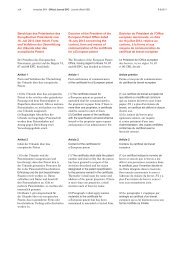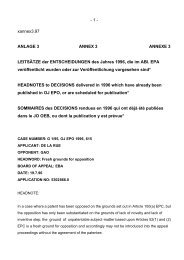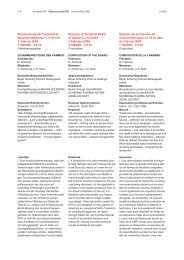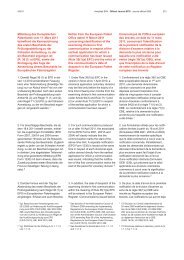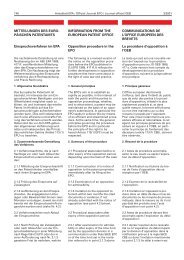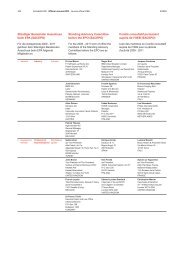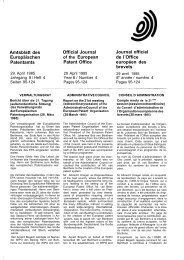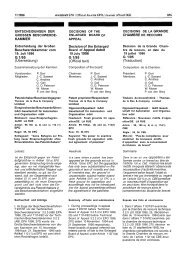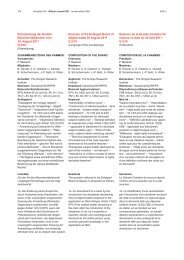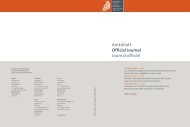Entscheidung der Großen Beschwerdekammer vom 23. Juli 2012 G ...
Entscheidung der Großen Beschwerdekammer vom 23. Juli 2012 G ...
Entscheidung der Großen Beschwerdekammer vom 23. Juli 2012 G ...
Create successful ePaper yourself
Turn your PDF publications into a flip-book with our unique Google optimized e-Paper software.
4/2013 Amtsblatt EPA Official Journal EPO Journal officiel OEB 205<br />
genden Fall betreffen, nämlich die Auslegung<br />
<strong>der</strong> Regel 140 EPÜ, die Abgrenzung<br />
<strong>der</strong> Zuständigkeit von Prüfungsund<br />
Einspruchsabteilung sowie die<br />
mögliche Überlappung von einseitigem<br />
und mehrseitigem Verfahren. Die Verfahrensvorschriften<br />
des EPÜ enthalten<br />
hierzu keine Aussage, und die ständige<br />
Rechtsprechung <strong>der</strong> <strong>Beschwerdekammer</strong>n<br />
ist zumindest teilweise uneinheitlich<br />
(s. vorstehende Nr. V.4). Die Vorlage<br />
ist somit zulässig, weil sie die beiden in<br />
Artikel 112 (1) a) EPÜ genannten<br />
Voraussetzungen erfüllt, d. h. sie dient<br />
<strong>der</strong> Sicherung einer einheitlichen<br />
Rechtsanwendung, und es handelt sich<br />
um Rechtsfragen von grundsätzlicher<br />
Bedeutung.<br />
2. Regel 140 EPÜ lautet:<br />
"In <strong>Entscheidung</strong>en des Europäischen<br />
Patentamts können nur sprachliche<br />
Fehler, Schreibfehler und offenbare<br />
Unrichtigkeiten berichtigt werden."<br />
Dies ist exakt <strong>der</strong>selbe Wortlaut wie in<br />
<strong>der</strong> früheren Regel 89 EPÜ 1973. Daher<br />
wird, auch wenn es hier um beide Fassungen<br />
geht, nicht zwischen <strong>der</strong> jetzigen<br />
und <strong>der</strong> früheren Regel bzw. zwischen<br />
<strong>der</strong> Rechtsprechung zu <strong>der</strong> einen o<strong>der</strong><br />
<strong>der</strong> an<strong>der</strong>en unterschieden.<br />
3. In den Vorlagefragen wird die<br />
Formulierung "Antrag auf Berichtigung<br />
des Erteilungsbeschlusses nach<br />
Regel 140 EPÜ" verwendet, und demzufolge<br />
geht es in dieser <strong>Entscheidung</strong><br />
nicht um die Berichtigung irgendwelcher<br />
an<strong>der</strong>er <strong>Entscheidung</strong>en. Ferner ist trotz<br />
<strong>der</strong> Bezugnahme auf die Berichtigung<br />
von Erteilungsbeschlüssen klar, dass es<br />
in <strong>der</strong> Vorlageentscheidung nur um den<br />
Wortlaut von Patenten geht, die als<br />
Bestandteil des Erteilungsbeschlusses<br />
angesehen werden, da in Mitteilungen<br />
nach Regel 71 (3) EPÜ darauf verwiesen<br />
wird (s. T 850/95, ABl. EPA 1996, 455,<br />
Nr. 2 <strong>der</strong> <strong>Entscheidung</strong>sgründe). Diese<br />
<strong>Entscheidung</strong> beschränkt sich daher auf<br />
Berichtigungen, die im Patent selbst<br />
vorgenommen werden, d. h. in <strong>der</strong><br />
Beschreibung, den Ansprüchen und den<br />
Zeichnungen (häufig als "Patentunterlagen"<br />
bezeichnet). Ein beson<strong>der</strong>es<br />
Merkmal dieser Patentunterlagen ist,<br />
dass sie nicht nur <strong>vom</strong> Patentanmel<strong>der</strong><br />
erstellt werden, son<strong>der</strong>n auch nur mit<br />
tion of the respective competences of<br />
the examining and opposition divisions,<br />
and the possible intercalation of ex parte<br />
and inter partes proceedings. The procedural<br />
provisions of the EPC are silent<br />
on these issues and the case law of<br />
the boards of appeal is at least partly<br />
divergent (see section V.4 above). Thus<br />
the present referral is admissible as it<br />
serves both the purposes mentioned in<br />
Article 112(1)(a) EPC, namely ensuring<br />
uniform application of the law and<br />
addressing points of law of fundamental<br />
importance.<br />
2. Rule 140 EPC reads:<br />
"In decisions of the European Patent<br />
Office, only linguistic errors, errors of<br />
transcription and obvious mistakes may<br />
be corrected."<br />
This is exactly the same wording as the<br />
previous Rule 89 EPC 1973. Accordingly,<br />
while both are referred to herein,<br />
no distinction is made between the<br />
present and previous rules or between<br />
the case law relating to one or other of<br />
them.<br />
3. The referred questions use the<br />
expression "request for correction of the<br />
grant decision un<strong>der</strong> Rule 140 EPC" and<br />
therefore this decision is not concerned<br />
with corrections of any other decisions.<br />
Further, even in the context of corrections<br />
of grant decisions, it is clear that<br />
the referring decision is concerned only<br />
with the text of patents which are treated<br />
as an integral part of grant decisions by<br />
reason of being referred to in communications<br />
un<strong>der</strong> Rule 71(3) EPC (see<br />
T 850/95, OJ EPO 1996, 455, point 2 of<br />
the Reasons). Accordingly this decision<br />
is further confined to corrections of<br />
patents themselves – to the description,<br />
claims and drawings (often called the<br />
"patent documents"). Such patent documents<br />
have the particular characteristics<br />
that they are not only supplied by a<br />
patent applicant but also that they may<br />
only be the subject of a decision to<br />
grant if approved by the applicant (see<br />
Article 113(2) and Rule 71 EPC and<br />
point 10 below). The Enlarged Board's<br />
savoir l'interprétation de la règle 140 CBE,<br />
la délimitation des compétences respectives<br />
des divisions d'examen et des divisions<br />
d'opposition, ainsi que l'éventuelle<br />
imbrication des procédures ex parte et<br />
inter partes. Les dispositions de procédure<br />
de la CBE sont muettes sur ces<br />
points et la jurisprudence des chambres<br />
de recours est divergente, au moins<br />
en partie (cf. point V.4 ci-dessus). La<br />
présente saisine est donc recevable<br />
puisqu'elle contribue aux deux objectifs<br />
mentionnés à l'article 112(1)a) CBE, qui<br />
consistent à assurer une application<br />
uniforme du droit et à traiter des questions<br />
de droit d'importance fondamentale.<br />
2. La règle 140 CBE s'énonce comme<br />
suit :<br />
"Dans les décisions de l'Office européen<br />
des brevets, seules les fautes d'expression,<br />
de transcription et les erreurs manifestes<br />
peuvent être rectifiées."<br />
Cet énoncé est exactement identique à<br />
celui de l'ancienne règle 89 CBE 1973.<br />
Par conséquent, lorsqu'il est fait référence<br />
à ces deux règles dans la<br />
présente décision, aucune distinction<br />
n'est pour autant établie entre l'ancienne<br />
et l'actuelle règle ou entre la jurisprudence<br />
relative à la première ou celle se<br />
rapportant à la deuxième.<br />
3. Les questions soumises utilisant<br />
l'expression "requête formulée [...] en<br />
vertu de la règle 140 CBE aux fins de<br />
rectification de la décision de délivrance",<br />
la présente décision ne porte<br />
pas sur la rectification d'autres décisions.<br />
De plus, même dans le contexte relatif<br />
à la rectification de décisions de délivrance,<br />
la décision de saisine a manifestement<br />
pour seul objet le texte des<br />
brevets, lesquels sont considérés<br />
comme faisant partie intégrante des<br />
décisions de délivrance puisqu'ils sont<br />
cités dans les notifications établies<br />
conformément à la règle 71(3) CBE (cf.<br />
T 850/95, JO OEB 1996, 455, point 2<br />
des motifs). La présente décision portera<br />
donc uniquement sur la rectification des<br />
brevets proprement dits, à savoir la rectification<br />
de la description, des revendications<br />
et des dessins (souvent dénommés<br />
"documents brevets"). Ces documents<br />
brevets ont ceci de particulier qu'ils sont<br />
non seulement produits par un demandeur<br />
de brevet, mais également qu'ils ne



